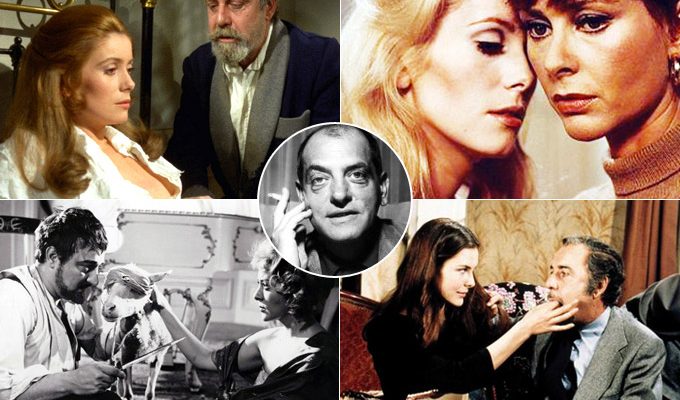 Anti-establishment to the core and arguably one of the original enfante terrible filmmakers, Luis Bunuel had three preoccupations, no, obsessions that he charted for his entire career: religion, class and sexual desire. Labeled a surrealist early on his career due to “Un Chien Andalou,” his famous collaboration with Salvador Dali (responsible for one of cinema’s most famous images, of a razor blade slicing an eyeball, and made when the filmmaker was just 29) it would be extremely pat to reduce Bunuel’s long and eclectic career to that idiosyncratic work. A blasphemous heretic to the church, several of Bunuel’s films were flagrant censures of religion and the Catholic church, which saw him fleeing Spain more than once during his career.
Anti-establishment to the core and arguably one of the original enfante terrible filmmakers, Luis Bunuel had three preoccupations, no, obsessions that he charted for his entire career: religion, class and sexual desire. Labeled a surrealist early on his career due to “Un Chien Andalou,” his famous collaboration with Salvador Dali (responsible for one of cinema’s most famous images, of a razor blade slicing an eyeball, and made when the filmmaker was just 29) it would be extremely pat to reduce Bunuel’s long and eclectic career to that idiosyncratic work. A blasphemous heretic to the church, several of Bunuel’s films were flagrant censures of religion and the Catholic church, which saw him fleeing Spain more than once during his career.
But, as we said, religion was hardly his only preoccupation. A diabolical provocateur, Bunuel was an incorrigible scourge of hypocrites, authority and the bourgeoise, even while he continued to operate within the system (he was under contract to Hollywood studios through much of the 1940s, though no work came of it, and won an Academy Award late in his career), his films often proving to be delicious and delirious screeds, even if they were often more soulful than his critics believe.
We’re always looking for a good excuse to indulge in our cinephile tendencies and with Bunuel’s “Tristana” coming out on Blu-Ray this month, via the Cohen Media Group, we felt this was as good as excuse as any to discuss one of our favorite filmmakers. Bunuel’s career is pretty expansive, lasting as it did for almost seventy years, but we’ve picked out ten of his films from across the decades that we believe are the true essentials of his career. Take a look below.
 “Los Olvidados”(1950)
“Los Olvidados”(1950)
Much more in tune with Italian neorealism than the surrealism he became known for, Bunuel’s “Los Olvidados” was the filmmaker’s first feature-length film and second international breakthrough made twenty years after the director’s original success and notoriety with “Un Chien Adalou” and “L’Age d’Or.” Translated literally as “The Forgotten Ones” and released as “The Young and the Damned” in the U.S., the picture is uncharacteristically conventional and an uncompromising, grim and tragic examination of the marginalized and destitute children of Mexico’s slums (and not thematically different from 1932’s faux documentary “Land Without Bread,” a look at Spain’s own paucity though without as much contemptible bite). A powerful social-realist story of juvenile delinquents without many redeeming qualities outside of their love for each other, “Los Olvidados” wastes no time depicting the dire and inevitably heartbreaking circumstances that will decide their fate. Centering on two street punks caught in the cycle of poverty and violence in the disease-ridden barrios of Mexico, one has a semblance of decency while the other, recently escaped from juvenile detention, seems incorrigibly malicious, a victim of circumstance. During a fight, the elder unpleasant boy accidentally kills another boy and threatens his younger accomplice to never utter a word. Charting the consequences it has on both teenagers and their friendship, the picture features nary a trace of the director’s fanciful flourishes, though the movie does contain a dream sequence where one of the guilt-ridden boys is haunted by the murder. After an ignominious 20 years where Bunuel had to leave Spain for the U.S. and take odd jobs to pay the rent (working at MOMA in New York, acting as a Spanish Dubbing Producer, getting removed from the production staff of Warner Bros.‘ “Beast With Five Fingers” in 1946), before coming to Mexico, “Los Olvidados” was a major comeback for the director (at the ripe old age of 50 no less) and he would direct a startling 26 more pictures until his death in 1983 at the age of 83. While ‘Olvidados’ was reviled in Mexico initially — the Mexicans saw this foreigner’s film as an insult to their country, so much so that an alternate “happy” ending was shot — Bunuel won the Best Director prize at Cannes that year and the film was immediately reappraised within the country as the director shot back to international celebrity status.

